The Unexpected Afterlife of American Communism
The New York Times
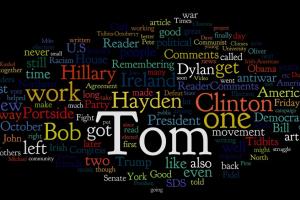 Reader Comments: Two Weeks to Go - Dump Trump, Defeat Racism and Misogyny; Learning to Claim Our Victories; Bernie Sanders' Donor Network Comes Thru for House and Senate Candidates; John Oliver on Third Parties; Support Hillary, Then Fight Like Hell; and: Remembering Tom Hayden; Syria; Silencing Librarians; DuBois and the Fight for Peace; Bob Dylan; Announcements; and more...
Reader Comments: Two Weeks to Go - Dump Trump, Defeat Racism and Misogyny; Learning to Claim Our Victories; Bernie Sanders' Donor Network Comes Thru for House and Senate Candidates; John Oliver on Third Parties; Support Hillary, Then Fight Like Hell; and: Remembering Tom Hayden; Syria; Silencing Librarians; DuBois and the Fight for Peace; Bob Dylan; Announcements; and more...
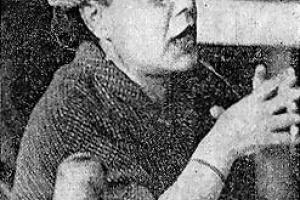 Passed into law in 1940, the Smith Act made it illegal to "teach, advocate or encourage the overthrow" of the government and extended to any member of an organization that allegedly did so. The notion that in 1956 the Communist Party was interested in, let alone capable of, overthrowing anything was patently absurd. From a 1940's peak of around 80,000, the CP's national membership had dwindled to perhaps 10,000 by the time of the hearings in Connecticut.
Passed into law in 1940, the Smith Act made it illegal to "teach, advocate or encourage the overthrow" of the government and extended to any member of an organization that allegedly did so. The notion that in 1956 the Communist Party was interested in, let alone capable of, overthrowing anything was patently absurd. From a 1940's peak of around 80,000, the CP's national membership had dwindled to perhaps 10,000 by the time of the hearings in Connecticut.
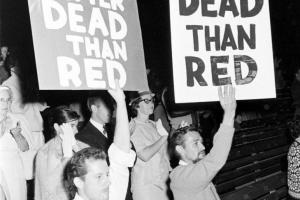 Americans have largely forgotten the anti-Communist sentiment from decades past. Anti-communism has been a powerful force for over 150 years. American communism has always been racialized. When Jim Crow laws banned interracial organization, the Communist Party was the only group that dared to flout the rule. Socialists and Communists in the South in the 1930s fought both economic and racial inequality - an important lessor for today's developing socialist movement.
Americans have largely forgotten the anti-Communist sentiment from decades past. Anti-communism has been a powerful force for over 150 years. American communism has always been racialized. When Jim Crow laws banned interracial organization, the Communist Party was the only group that dared to flout the rule. Socialists and Communists in the South in the 1930s fought both economic and racial inequality - an important lessor for today's developing socialist movement.
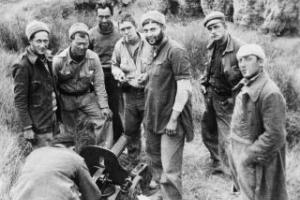 Based on personal stories of Abraham Lincoln Battalion survivors, Hochschild writes of their courage in an unequal contest where the Fascists had the unstinting support of German and Italian governments while the Democracies embargoed all arms to the Spanish government, an alliance of centrist and leftist parties-this while the Soviets worked to tamp down popular land and factory seizures for fear of inciting those capitalist Democracies to outrightly side with the Right
Based on personal stories of Abraham Lincoln Battalion survivors, Hochschild writes of their courage in an unequal contest where the Fascists had the unstinting support of German and Italian governments while the Democracies embargoed all arms to the Spanish government, an alliance of centrist and leftist parties-this while the Soviets worked to tamp down popular land and factory seizures for fear of inciting those capitalist Democracies to outrightly side with the Right
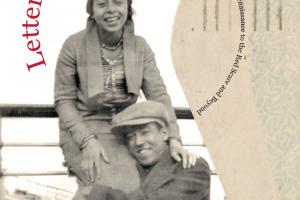 "Letters from Langston: From the Harlem Renaissance to the Red Scare and Beyond" is both a compilation of an intriguing exchange of letters among five heroic African Americans and a loving tribute to the letter writers from the daughters of four of the writers: Evelyn Louise Crawford and MaryLouise Patterson.
"Letters from Langston: From the Harlem Renaissance to the Red Scare and Beyond" is both a compilation of an intriguing exchange of letters among five heroic African Americans and a loving tribute to the letter writers from the daughters of four of the writers: Evelyn Louise Crawford and MaryLouise Patterson.
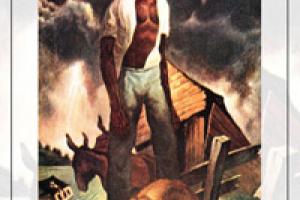 Using original source material Brian Dolinar arrives at a different explanation of why the popular front of 30s and 40s broke up, than that of mainstream media of that time, and since. The key agents of disunity were not the Communists but the manifold assault by the rightwing establishment. The US ruling class used opinion-molding Red-scare and Red-baiting campaigns in the mass media and culture. A lesson for today with the re-growth of the radical right.
Using original source material Brian Dolinar arrives at a different explanation of why the popular front of 30s and 40s broke up, than that of mainstream media of that time, and since. The key agents of disunity were not the Communists but the manifold assault by the rightwing establishment. The US ruling class used opinion-molding Red-scare and Red-baiting campaigns in the mass media and culture. A lesson for today with the re-growth of the radical right.
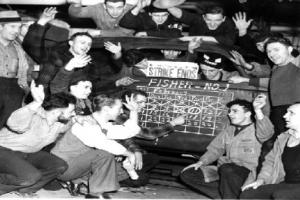 At the center of the liberal democratic system, workers have fiercely resisted exploitation through the development of worker-based organizations rooted in the ideal of paving the road to a classless and democratic society. All those seeking greater labor militancy must recognize that traditional unions are unable to escape the trap set in the 1930s through fidelity to the collective bargaining agreement. [An earlier version was published by CounterPunch.]
At the center of the liberal democratic system, workers have fiercely resisted exploitation through the development of worker-based organizations rooted in the ideal of paving the road to a classless and democratic society. All those seeking greater labor militancy must recognize that traditional unions are unable to escape the trap set in the 1930s through fidelity to the collective bargaining agreement. [An earlier version was published by CounterPunch.]
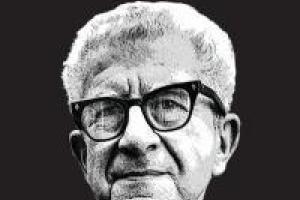 Herbert Aptheker, to introduce the man by his highest prestige, was an early scholar of African American uprisings against slavery, and in his middle years, the director and coordinator of the W.E.B. DuBois Papers, one of the great archival triumphs of US history at large. For many in the 60s, through his books and public apperances, a generation became aware of the Communist Party, U.S.A.
Herbert Aptheker, to introduce the man by his highest prestige, was an early scholar of African American uprisings against slavery, and in his middle years, the director and coordinator of the W.E.B. DuBois Papers, one of the great archival triumphs of US history at large. For many in the 60s, through his books and public apperances, a generation became aware of the Communist Party, U.S.A.
Spread the word